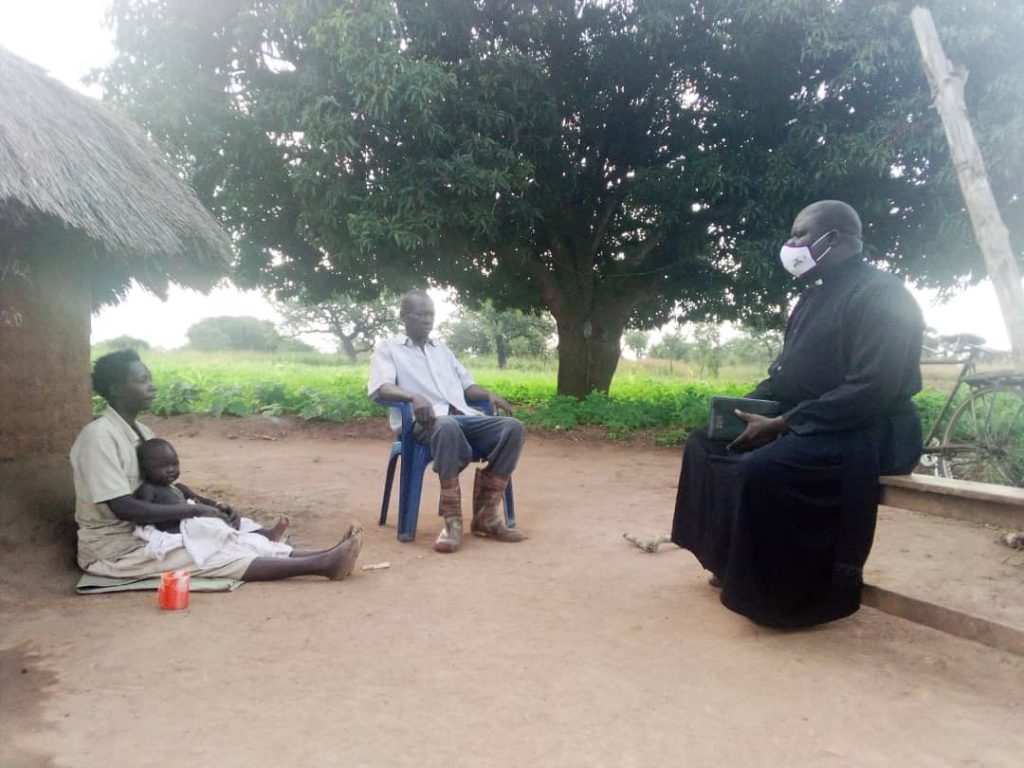Reverend Jimmy Max Ajon is committed to ensuring that no community member in Northern Uganda’s Otuke District loses their life to malaria amidst the COVID-19 pandemic.
“Religious leaders have a role to play: to not only preach the word of God but also to ensure our people are safe from any form of illness for the betterment of the Kingdom of God,” Rev. Ajon said.
Malaria is the leading cause of illness in Uganda and is responsible for most outpatient visits, hospital admissions and deaths—and experts fear this toll could rise if malaria control efforts are halted by the pandemic.
One proven way to protect families from malaria-carrying mosquitoes is to spray the walls of homes with insecticide, a process called indoor residual spraying (IRS). But sometimes families are hesitant to have their homes sprayed, especially during COVID-19. Rev. Ajon spoke on radio talk shows and called upon every community member to open their house for spraying and to support the spray teams in controlling malaria. Through door-to-door visits, he personally reached out to reluctant individuals and successfully persuaded them to permit their houses to be sprayed.
Rev. Ajon is one of 102 faith leaders in Uganda engaged by the U.S. President’s Malaria Initiative to improve acceptance of malaria control interventions among the faithful, including IRS and the use of insecticide-treated mosquito nets.
Recognizing that religious leaders have the potential to promote and sustain positive change in the community through their well-established outreach and community programs, PMI VectorLink Project organized community dialogues and meetings with key religious, cultural, and opinion leaders.
The project trained the leaders on the benefits of IRS and bed nets, community mobilization and advocacy techniques, and also enlisted their support in promoting IRS and supervising its implementation in their respective communities. Rev. Ajon and other local leaders then joined the project supervision teams to mobilize, monitor, and supervise the spray activities in various sites in Otuke District.
“Before IRS was introduced, many community members, including my family, used to frequently visit the health facilities due to malaria. Now the malaria episodes have reduced in my household,” Rev. Ajon said. “Many communities in Otuke have directly benefited from the intervention, and there is a reduction in the numbers of people who line up at the health facilities.”
The project noted increased IRS acceptance in the communities with the demand for IRS greatly increased as well, thanks to the involvement of religious and community leaders like Rev. Ajon. For example, in Otuke District, the project surpassed the spray target by 12 percent and protected 20,000 more people than planned with no cases of COVID-19 transmission reported during the campaign. The project protected approximately 5 million people from malaria overall.
Rev. Ajon has pledged to continue speaking at funerals, church services, and other faith community outreach meetings about the benefits of spraying houses and sleeping under mosquito nets to ensure that the burden of malaria is drastically reduced. He also pledged to remind communities to go to the health centers for testing and treatment if they have signs and symptoms of malaria in order to rid Otuke District of malaria.
“Fighting malaria and COVID-19 is not the role of the health workers alone,” Rev. Ajon said. “We need everybody’s contribution, and the first contribution is personal responsibility for your safety and that of your loved ones so that we can protect the communities from both malaria and COVID-19.”

